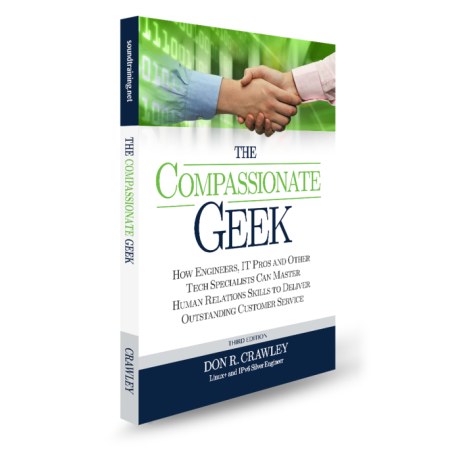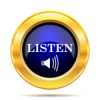Podcast: Play in new window | Download
Subscribe Now Apple Podcasts | RSS
Have you ever had something you’ve heard or read change your life? In my seminars and workshops on customer service and communication for IT staff, I often talk about four books that changed my life. These are certainly not the only life changing books. They’re just four books, among many, that have made a difference for me in my life. Here they are, in no particular order.
The Seven Habits of Highly Effective People by Stephen R. Covey. This is the book that put Stephen Covey on the map. In it, he describes seven habits of the kinds of people whom you tend to admire and respect. Many of today’s leading motivational speakers quote Covey’s Seven Habits. From beginning with the end in mind to sharpening the saw, Covey’s wisdom is both accessible and actionable. You can understand it and do something with it.
Man’s Search for Meaning by Viktor E. Frankl. Dr. Frankl published this book in 1946 shortly after the end of World War Two. In his book, Dr. Frankl reflects on his experiences in Nazi concentration camps. He developed a belief that a person’s primary motivational force is his or her search for meaning. One of the lessons I took from reading Man’s Search for Meaning is that the real measure of person is not his her accomplishments, but rather his or her ability to maintain a sense of dignity in all situations, even (or perhaps especially) in terribly undignified situations.
Don’t Believe Everything You Think by Thomas Kida. I chose this book because it challenges us to challenge our most deeply held beliefs. Author Kida details the six basic flaws in our thinking:
- We prefer stories to statistics
- We seek to confirm, not to question, our ideas
- We rarely appreciate the role of chance and coincidence in shaping events
- We sometimes misperceive the world around us
- We tend to oversimplify our thinking
- Our memories are often inaccurate
The final entry on my list of four life changing books is Dale Carnegie’s How to Win Friends and Influence People, first published in 1936 and still popular today. The language is, frankly, dated and a little corny, but the wisdom is absolutely relevant. Carnegie had a knack for understanding and influencing people and he shares his ideas in the four sections of his book.
Each of these four books is an easy read. You should be able to read each of them in one or two sittings. You may not agree with everything they present, but each of them is good at presenting their unique perspectives on life and living with our fellow humans on the earth. Each of them is also good at challenging us to think and act differently and, hopefully, more effectively.
Perhaps you have your own favorites. Please share them in the comments. Great books, whether fiction or non-fiction, inform us, challenge us, and at their best, change us. Whether you choose these four books or others, choose to read. Especially choose to read things with which you may not agree. Dr. Seuss said it well, “The more that you read, the more things you will know. The more that you learn, the more places you’ll go.”
For More Ideas on How to Improve Communication and Customer Service Skills
Bring my IT customer service training seminar onsite to your location for your group, small or large. Click here for the course description and outline.
 Pick up a copy of my IT customer service book The Compassionate Geek: How Engineers, IT Pros, and Other Tech Specialists Can Master Human Relations Skills to Deliver Outstanding Customer Service, available through Amazon and other resellers.
Pick up a copy of my IT customer service book The Compassionate Geek: How Engineers, IT Pros, and Other Tech Specialists Can Master Human Relations Skills to Deliver Outstanding Customer Service, available through Amazon and other resellers.
Please Leave a Comment
If you find this post helpful or if you have additional thoughts, please leave a comment.



